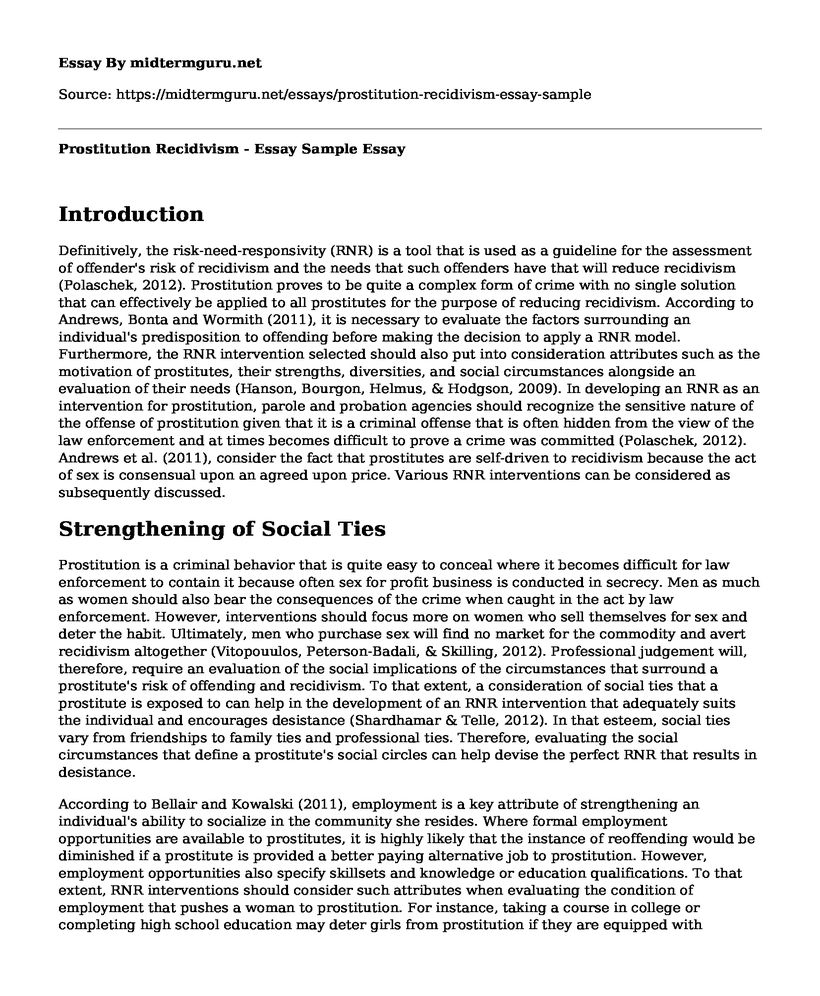Introduction
Definitively, the risk-need-responsivity (RNR) is a tool that is used as a guideline for the assessment of offender's risk of recidivism and the needs that such offenders have that will reduce recidivism (Polaschek, 2012). Prostitution proves to be quite a complex form of crime with no single solution that can effectively be applied to all prostitutes for the purpose of reducing recidivism. According to Andrews, Bonta and Wormith (2011), it is necessary to evaluate the factors surrounding an individual's predisposition to offending before making the decision to apply a RNR model. Furthermore, the RNR intervention selected should also put into consideration attributes such as the motivation of prostitutes, their strengths, diversities, and social circumstances alongside an evaluation of their needs (Hanson, Bourgon, Helmus, & Hodgson, 2009). In developing an RNR as an intervention for prostitution, parole and probation agencies should recognize the sensitive nature of the offense of prostitution given that it is a criminal offense that is often hidden from the view of the law enforcement and at times becomes difficult to prove a crime was committed (Polaschek, 2012). Andrews et al. (2011), consider the fact that prostitutes are self-driven to recidivism because the act of sex is consensual upon an agreed upon price. Various RNR interventions can be considered as subsequently discussed.
Strengthening of Social Ties
Prostitution is a criminal behavior that is quite easy to conceal where it becomes difficult for law enforcement to contain it because often sex for profit business is conducted in secrecy. Men as much as women should also bear the consequences of the crime when caught in the act by law enforcement. However, interventions should focus more on women who sell themselves for sex and deter the habit. Ultimately, men who purchase sex will find no market for the commodity and avert recidivism altogether (Vitopouulos, Peterson-Badali, & Skilling, 2012). Professional judgement will, therefore, require an evaluation of the social implications of the circumstances that surround a prostitute's risk of offending and recidivism. To that extent, a consideration of social ties that a prostitute is exposed to can help in the development of an RNR intervention that adequately suits the individual and encourages desistance (Shardhamar & Telle, 2012). In that esteem, social ties vary from friendships to family ties and professional ties. Therefore, evaluating the social circumstances that define a prostitute's social circles can help devise the perfect RNR that results in desistance.
According to Bellair and Kowalski (2011), employment is a key attribute of strengthening an individual's ability to socialize in the community she resides. Where formal employment opportunities are available to prostitutes, it is highly likely that the instance of reoffending would be diminished if a prostitute is provided a better paying alternative job to prostitution. However, employment opportunities also specify skillsets and knowledge or education qualifications. To that extent, RNR interventions should consider such attributes when evaluating the condition of employment that pushes a woman to prostitution. For instance, taking a course in college or completing high school education may deter girls from prostitution if they are equipped with knowledge and skills required by employers through education. In a study conducted by van Schellen, Apel, and Nieuwbeerta (2012) to evaluate marriage versus cohabitation implications for offending among women, it was established that women committed to a financial obligation in a relationship were less likely to commit a criminal offense. However, the same cannot be said for prostitution as an offense since women who go into prostitution also do so to provide for their families. To that extent, employment as a means to provide should offer women an alternative to prostitution.
In the same study, it was also found that women in relationships were less likely to offend especially if the male partner she is cohabiting or married to has no criminal history or is successfully desisting from reoffending (van Schellen, Apel, & Niewbeerta, 2012). Women who are in committed relationships with their boyfriends or husbands are less likely to offend as prostitutes especially if the couple is in a financially stable relationship. Evaluating the social support that a prostitute receives from a spouse will also provide probation and parole officers with a person to hold the prostitute accountable for her actions. In essence, if the spouse of the prostitute does not approve of her craft, he might be a perfect source of motivation for his girlfriend or wife in the journey of desistance. Therefore, coupling proves to be a critical element in the development of RNR intervention for prostitution.
Cite this page
Prostitution Recidivism - Essay Sample. (2023, Jan 04). Retrieved from https://midtermguru.com/essays/prostitution-recidivism-essay-sample
If you are the original author of this essay and no longer wish to have it published on the midtermguru.com website, please click below to request its removal:
- Kinds of "Japaneseness" Can We Find in Koreeda's Films - Paper Example
- Paper Example on Nationwide Death Penalty Policy
- Women and Crime in the 18th Century and Their Status in Society in General - Essay Sample
- Compare and Contrast Essay on Feminist Supervision and Gender Role Conflict
- Feminism: Overcoming Male-Centric Society & Misconceptions - Essay Sample
- Residents of Prinsloo vs Oil Refinery: An Ethical Dilemma - Essay Sample
- Attention Deficit Hyperactivity Disorder and Criminality Continued Care - Research Paper







